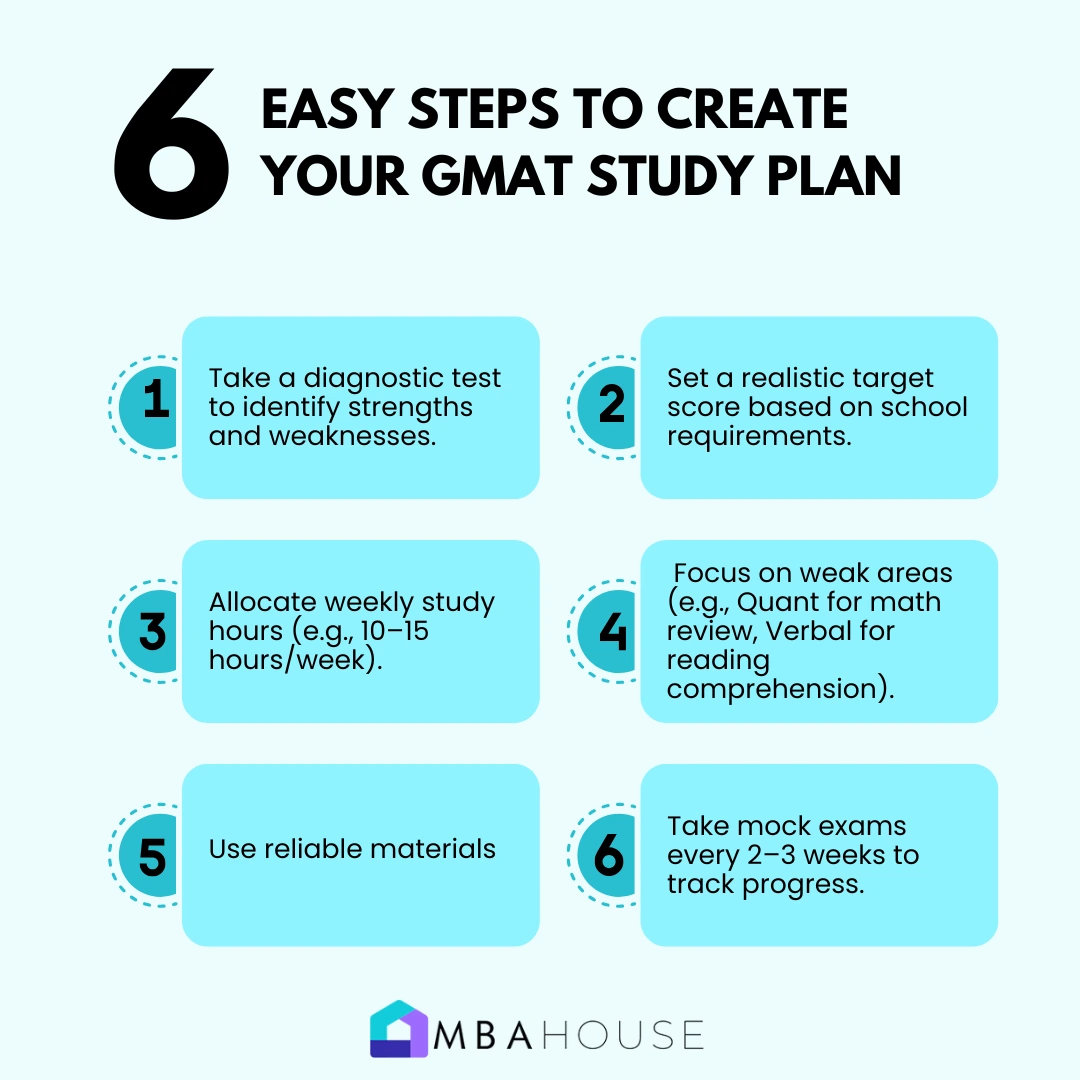Preparing for the GMAT is one of the biggest hurdles on the journey to business school. But one of the most common questions among test-takers is, “How long do I need to study for the GMAT?”
The answer isn’t one-size-fits-all because preparation time depends on various factors like your starting point, target score, and schedule flexibility. But don’t worry—this blog will guide you step-by-step to determine the ideal GMAT prep time, craft a study plan, and tackle the exam confidently.
This comprehensive guide will help you determine:
- How to evaluate your current standing and target score.
- The typical study timelines based on score goals.
- Factors affecting your preparation time.
- Step-by-step instructions to create an effective GMAT study plan tailored to your needs.
- Practical tips to stay motivated and track progress.
By the end, you’ll have a clear roadmap to confidently tackle the GMAT and inch closer to securing a spot at your dream MBA program.
Before diving in, if you’re worried about mastering GMAT verbal reasoning, check out our blog on GMAT Verbal Reasoning: Strategies for Excellence, which has actionable tips to tackle this tricky section.
Now, let’s help you create a personalized plan for success.
Understanding Your Starting Point and Goals
The GMAT (Graduate Management Admission Test) is a standardized exam designed to assess your skills in analytical writing, quantitative reasoning, verbal reasoning, and integrated reasoning. It’s an essential requirement for admission to top business schools globally.
But the time needed to prepare for the GMAT depends on two major factors:
- Your Starting Point: What’s your current skill level?
- Your Target Score: What score do you need to get into your preferred MBA program?
Evaluate Your Starting Point
Taking a diagnostic test is the first step. It helps you identify your strengths and weaknesses across the GMAT’s four sections:
- Quantitative Reasoning: Assesses math and problem-solving skills.
- Verbal Reasoning: Tests your understanding of written English and critical reasoning.
- Integrated Reasoning: Evaluates your ability to interpret and analyze complex data.
- Analytical Writing: Measures your ability to think critically and communicate your ideas.
Example: If you score 550 on a practice test but need 700 to get into a competitive school like Wharton, you’ll need significant improvement in your preparation.
Start Your GMAT Prep Today
Research Your Target Schools
Your target score should align with the average GMAT scores of the programs you’re applying to.
Here’s a table of top schools and their average GMAT scores:
| Business School | GMAT Score |
| Harvard Business School | 730 |
| Stanford GSB | 738 |
| Kellogg School of Management | 727 |
| INSEAD | 710 |
| MIT Sloan | 720 |
If your target program has an average score of 700+, plan for 3–6 months of dedicated study.
How Long Does It Take to Study for the GMAT?
The ideal study time depends on the gap between your baseline score and your target score.
Below is a breakdown of typical timelines:
| Target Score Improvement | Hours Required | Duration (at 10-15 hrs/week) |
| +50 points | 60–80 hours | 1–2 months |
| +100 points | 100–150 hours | 2–3 months |
| +200 points | 200+ hours | 4–6 months |
Pro Tip: Avoid Burnout
Studying too many hours in one day can lead to diminishing returns. Aim for 1–2 hours per weekday and 4–5 hours on weekends to maintain consistency and focus.
Step-by-Step Guide to Creating a Study Plan for the GMAT
Step 1: Take a Diagnostic Test
Begin your journey with a diagnostic test to determine your starting score. Free resources like GMAT Official Practice Tests or Manhattan Prep’s mock exams can help.
Step 2: Set a Realistic Target Score
Align your goal with the requirements of your target schools. Aiming for a higher score gives you a competitive edge but requires more effort.
Step 3: Allocate Study Hours Weekly
Create a schedule that fits your lifestyle. Here’s an example:
- Weekdays: 1–2 hours focusing on practice questions.
- Weekends: 4–6 hours split between mock tests and review.
Step 4: Focus on Your Weaknesses
Spend more time on areas where your diagnostic test shows room for improvement. For instance:
- Quant: Review algebra, geometry, and data interpretation.
- Verbal: Practice reading comprehension and sentence correction.
Step 5: Use the Right GMAT Study Material
Select resources that align with your learning style. Options include:
- Books like The Official Guide for GMAT Review.
- Forums such as GMAT Club for peer discussions.
Step 6: Incorporate Mock Exams
Take full-length mock tests every 2–3 weeks to simulate real test conditions and track your progress.
The Best Way to Study for the GMAT
Combining multiple strategies ensures effective preparation:
- Active Learning: Solve problems daily to build muscle memory.
- Consistent Review: Use flashcards for quick revision of math formulas or grammar rules.
- Time Management: Practice under timed conditions to improve speed and accuracy.
Choosing the right time to prepare for the GMAT is just as crucial as the preparation itself. Whether you’re a college student aiming for a seamless transition to an MBA program or a working professional juggling responsibilities, crafting an effective GMAT study plan is the first step toward achieving your target score.
Resources That Make a Difference
-
GMAT Prep Classes
Investing in professional courses can save you time and effort. Classes provide structured learning and expert guidance, ensuring you stay on track. For a personalized approach, one-on-one tutoring is a great option.
-
GMAT Prep Books and Study Material
Choose materials that focus on both content and strategy. Official GMAT guides are a must, supplemented by advanced resources for harder questions.
-
How to Learn GMAT Effectively
Focus on mastering key topics like arithmetic, algebra, and critical reasoning. Utilize online question banks and practice tests to fine-tune your skills. The best way to study for the GMAT is to blend theoretical understanding with practical application.
Take Control of Your MBA Journey—Join Our GMAT Program Now!.
Avoiding Common Pitfalls
How Long to Study for GMAT
Many students fall into the trap of either rushing through or stretching their preparation. Stick to a defined timeline and ensure consistent effort.
- Procrastination: Set specific daily goals and use tools like Notion or ClickUp to stay organized.
- Burnout: Incorporate breaks and leisure activities into your schedule.
- Plateauing Scores: Analyze your mistakes in mock tests and adjust your GMAT study strategy.
Plan Around Your Schedule
Clear your calendar of major commitments. Workaround light periods at your job or during a gap before starting a new position. This ensures you’re dedicating focused time to preparation.
Motivation Tips
- Visualize your end goal: Admission to your dream MBA program.
- Reward yourself for small milestones, like completing a practice test.
Sample 10-Week GMAT Study Schedule
- Week 1-2: Arithmetic, Critical Reasoning, and Reading Comprehension
- Week 3-4: Algebra, Word Problems, and Statistics
- Week 5: Data Sufficiency and Review
- Week 6-8: Timed Practice Sets and Diagnostics
- Week 9-10: Advanced Practice and Final Review
This schedule can be adjusted to fit shorter or longer preparation periods, depending on your availability and progress.
The Role of Coaching in GMAT Success
Why Opt for Professional Help?
Navigating the vast pool of GMAT study material on your own can be overwhelming. GMAT prep classes offer a structured curriculum, ensuring you focus on what matters most. With expert feedback, you can avoid common mistakes and optimize your study time.
Online vs. In-Person Classes
Online classes provide flexibility, while in-person coaching often delivers a more immersive experience. Choose based on your learning style and availability.
MBA House offers a comprehensive GMAT coaching experience tailored to help you succeed.
With unlimited private tutoring, 50 hours of live classes, and a self-paced e-learning platform, you’ll have everything you need to excel. Whether you’re in Miami, New York, or online, our expert instructors provide focused, subject-specific guidance to build your confidence and skills.
From 21 live classes covering all GMAT topics to homework based on official GMAT questions (with solutions recorded by our teachers), we’ve got your back. Plus, you can revisit recorded lessons anytime and schedule as many private tutoring sessions as you need. With MBA House, you’re set to achieve your best score and take the next step toward your MBA goals.
Book Your Free Sample Class and Take the First Step Toward GMAT Success!.
FAQs:
How long does it take to study for the GMAT?
On average, 2–3 months of consistent study (100–150 hours) is enough for most test-takers aiming for a 50–100-point improvement.
How many hours to study GMAT per day?
1.5–2 hours daily is ideal for balancing retention and avoiding burnout.
Is the GMAT hard?
Yes, but it’s manageable with the right strategy. It tests critical thinking rather than memorization, so focus on problem-solving skills.
What study materials should I use?
Use a mix of GMAT study materials like official guides, GMAT prep books, and online resources for comprehensive preparation.
Wrapping Up
So, how long to study for GMAT?
It depends on your starting level, target score, and available time. The key is consistency, focus, and the use of high-quality resources. Whether you need 2 months or 6, creating a structured plan will set you up for success.
Remember… With the right approach, nothing can stop you from acing the exam!






Social Media